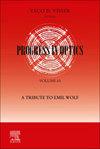Photonic Crystals with a Defect Fabricated by Two-Photon Polymerization for the Infrared Spectral Range
3区 物理与天体物理
Q1 Materials Science
引用次数: 12
Abstract
One-dimensional photonic crystals composed of alternating layers with high- and low-density were fabricated using two-photon polymerization from a single photosensitive polymer for the infrared spectral range. By introducing single high-density layers to break the periodicity of the photonic crystals, a narrow-band defect mode is induced. The defect mode is located in the center of the photonic bandgap of the one-dimensional photonic crystal. The fabricated photonic crystals were investigated using infrared reflection measurements. Stratified-layer optical models were employed in the design and characterization of the spectral response of the photonic crystals. A very good agreement was found between the model-calculated and measured reflection spectra. The geometric parameters of the photonic crystals obtained as a result of the optical model analysis were found to be in good agreement with the nominal dimensions of the photonic crystal constituents. This is supported by complimentary scanning electron microscope imaging, which verified the model-calculated, nominal layer thicknesses. Conventionally, the accurate fabrication of such structures would require layer-independent print parameters, which are difficult to obtain with high precision. In this study an alternative approach is employed, using density-dependent scaling factors, introduced here for the first time. Using these scaling factors a fast and true-to-design method for the fabrication of layers with significantly different surface-to-volume ratios. The reported observations furthermore demonstrate that the location and amplitude of defect modes is extremely sensitive to any layer thickness non-uniformities in the photonic crystal structure. Considering these capabilities, one-dimensional photonic crystals engineered with defect modes can be employed as narrow band filters, for instance, while also providing a method to quantify important fabrication parameters.红外光谱范围内双光子聚合制备缺陷光子晶体
采用双光子聚合的方法,在红外光谱范围内制备了由高密度和低密度交替层组成的一维光子晶体。通过引入单个高密度层来打破光子晶体的周期性,诱导出窄带缺陷模式。缺陷模位于一维光子晶体光子带隙的中心。利用红外反射测量对制备的光子晶体进行了研究。采用层状光学模型设计和表征光子晶体的光谱响应。模型计算的反射光谱与实测的非常吻合。通过光学模型分析得到的光子晶体几何参数与光子晶体组分的标称尺寸基本一致。这是由免费的扫描电子显微镜成像,验证了模型计算,标称层厚度的支持。传统上,这种结构的精确制造需要与层无关的打印参数,难以获得高精度的打印参数。在这项研究中,采用了一种替代方法,使用密度相关的缩放因子,这是第一次在这里介绍。利用这些比例因子,一种快速且符合设计的方法,可用于制造具有显著不同表面体积比的层。研究结果进一步表明,缺陷模的位置和振幅对光子晶体结构中任何层厚不均匀性都非常敏感。考虑到这些能力,一维光子晶体设计的缺陷模式可以用作窄带滤波器,例如,同时也提供了一种量化重要制造参数的方法。
本文章由计算机程序翻译,如有差异,请以英文原文为准。
求助全文
约1分钟内获得全文
求助全文

 求助内容:
求助内容: 应助结果提醒方式:
应助结果提醒方式:


